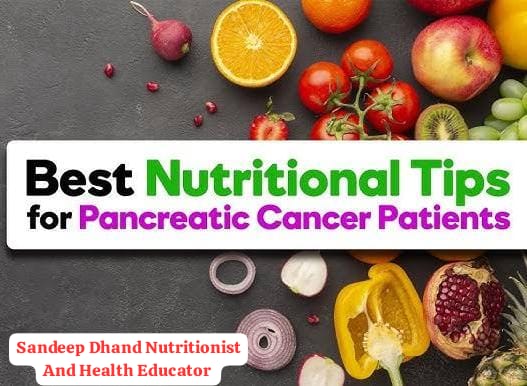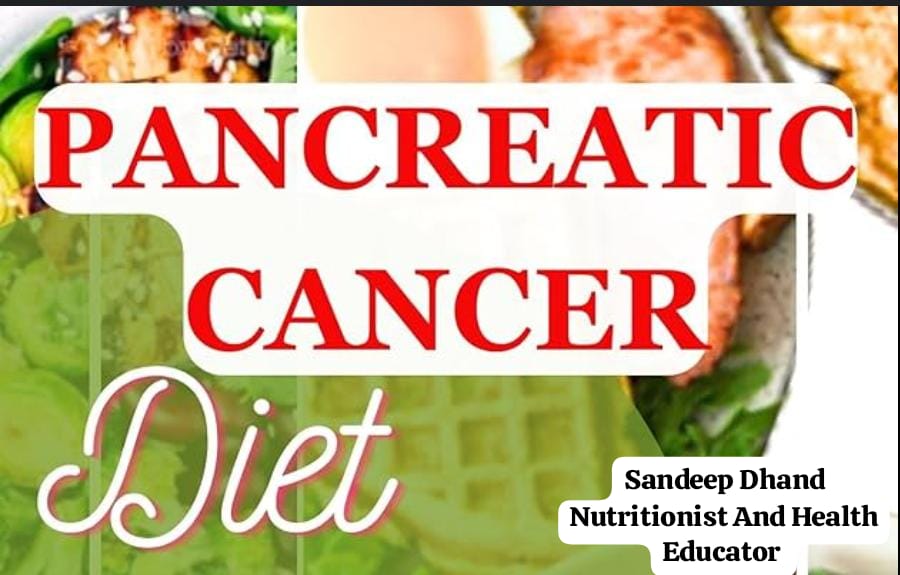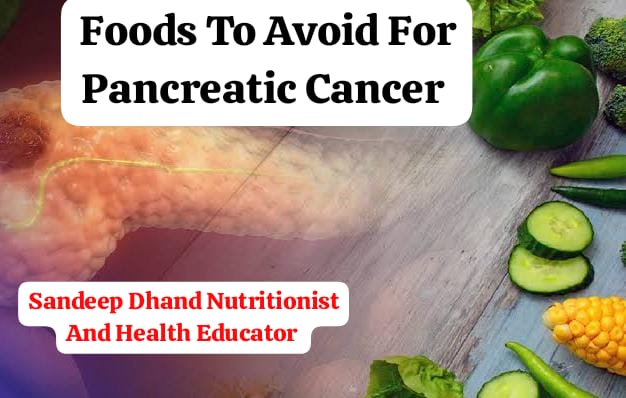Sandeep Dhand
Nutritionist And Health Educator
Pancreatic cancer is a severe condition that requires a combination of medical treatments and lifestyle changes. Among these, diet plays a vital role. A balanced and nutritious diet can help reduce the risk of developing pancreatic cancer and support patients undergoing treatment by improving their overall health and quality of life. Let’s explore how diet can influence pancreatic cancer prevention and management.
How Does Diet Affect Pancreatic Cancer?

Diet impacts pancreatic health in many ways:
- Reducing Risk Factors: Certain foods can lower inflammation and improve digestion, reducing the burden on the pancreas.
- Strengthening Immunity: A nutrient-rich diet boosts the immune system, helping the body fight cancer cells.
- Managing Weight: Obesity is a known risk factor for pancreatic cancer, and a proper diet helps maintain a healthy weight.
Diet for Pancreatic Cancer Prevention
While no food can guarantee complete prevention, adopting healthy eating habits significantly lowers the risk.
- Include More Fruits and Vegetables
Fruits and vegetables are rich in antioxidants, vitamins, and minerals that help combat inflammation and protect cells.
Examples: Spinach, broccoli, kale, carrots, berries, oranges, and tomatoes.
- Choose Whole Grains Over Refined Grains
Whole grains provide fiber, which supports digestion and reduces the risk of obesity.
Examples: Brown rice, whole wheat bread, oats, and quinoa.
- Opt for Lean Protein Sources
Protein supports tissue repair and energy levels without overloading the pancreas.
Examples: Skinless chicken, fish, eggs, lentils, and tofu.
- Avoid Processed Foods
Processed foods are often high in unhealthy fats, sugars, and preservatives that may increase cancer risk.
Examples to avoid: Packaged snacks, sugary drinks, and fried foods.
- Limit Red and Processed Meats
Red and processed meats contain chemicals that can damage pancreatic cells.
Choose plant-based proteins or lean meat instead.
- Stay Hydrated
Drinking enough water supports digestion and helps flush out toxins.
Aim for 8-10 glasses of water daily.
Diet for Pancreatic Cancer Patients

Patients diagnosed with pancreatic cancer often face challenges such as loss of appetite, difficulty digesting food, and weight loss. A tailored diet plan can alleviate these issues.
- Small, Frequent Meals
Eating small meals 5-6 times a day helps manage nausea and improves nutrient absorption.
- High-Calorie, Nutrient-Dense Foods
To combat weight loss, focus on calorie-rich yet healthy options.
Examples: Avocados, nuts, seeds, peanut butter, and full-fat yogurt.
- Easily Digestible Foods
Since the pancreas produces digestive enzymes, choose foods that are gentle on the stomach.
Examples: Boiled vegetables, mashed potatoes, clear soups, and smoothies.
- Enzyme Supplements
Many patients may need enzyme supplements to aid digestion. Consult a doctor for recommendations.
- Adequate Protein Intake
Protein helps repair tissues and build strength.
Examples: Scrambled eggs, protein shakes, and soft fish like salmon.
- Avoid Alcohol and Caffeine
These can irritate the pancreas and worsen symptoms. Stick to water, herbal teas, or diluted fruit juices.
Key Nutrients for Pancreatic Cancer Patients
- Antioxidants
Antioxidants fight free radicals that damage cells.
Sources: Blueberries, strawberries, spinach, and green tea.
- Omega-3 Fatty Acids
These reduce inflammation and improve overall health.
Sources: Fish (like salmon and mackerel), flaxseeds, and walnuts.
- Vitamins and Minerals
Important for immune health and energy.
Sources: Oranges (Vitamin C), bananas (potassium), and fortified cereals (B vitamins).
- Fiber
Helps prevent constipation, a common side effect of treatment.
Sources: Whole grains, apples, beans, and lentils.
Foods to Avoid for Pancreatic Health

- Refined Sugar:
Increases inflammation and can lead to weight gain.
Found in: Candies, sodas, and baked goods.
- Fried Foods:
High in unhealthy fats that strain the pancreas.
Examples: French fries, fried chicken, and chips.
- High-Fat Dairy Products:
Full-fat cheese and cream can be difficult to digest.
- Processed and Packaged Foods:
Contain preservatives and additives harmful to health.
Sample Diet Plan for Pancreatic Cancer Patients
Morning
Breakfast: Smoothie with banana, spinach, almond milk, and protein powder.
Snack: Handful of almonds or a boiled egg.
Afternoon
Lunch: Grilled fish, steamed broccoli, and brown rice.
Snack: Low-fat yogurt with fresh berries.
Evening
Dinner: Lentil soup, mashed sweet potatoes, and a side of green salad.
Snack: Herbal tea with a small slice of whole-grain bread.
Lifestyle Tips Alongside Diet
- Stay Active:
Gentle exercises like walking or yoga improve digestion and mood.
- Manage Stress:
High stress can worsen symptoms. Practice meditation or deep breathing.
- Regular Check-Ups:
Monitor your health and adjust your diet as needed with a healthcare provider.
Consult a Nutritionist
Every individual’s dietary needs are unique, especially during cancer treatment. A nutritionist can create a personalized plan that meets specific requirements and addresses symptoms like nausea, fatigue, or digestion issues.
Conclusion
A proper diet is a cornerstone of pancreatic cancer prevention and management. By focusing on nutrient-rich foods, avoiding harmful ingredients, and maintaining a healthy lifestyle, you can reduce the risk of pancreatic cancer and support recovery. Remember, small dietary changes can make a big difference in overall health and well-being.
